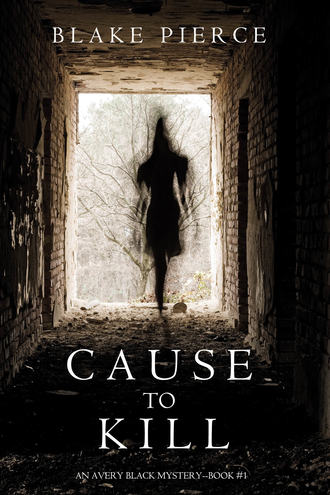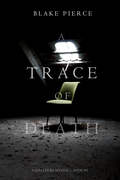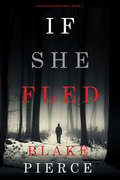
Блейк Пирс
Cause to Kill
CHAPTER THIRTY THREE
A quick conversation with Laura Hunt and Avery was in possession of the cell phone number and address of Gentry Villasco, as well as the names, addresses, and contact information for everyone on his team, just in case Villasco turned out to be a dead end.
Of the four people who worked for Gentry, two were women and two were men. The women lived in Chelsea and Boston, respectively, both well outside of Avery’s general range of the killer’s home. The first man commuted from South Boston, also outside the range. The last one lived in Watertown: Edwin Pesh. Watertown was one of Avery’s hotspots. She circled his name and hopped in the car. As she drove, Thompson plugged in all the names into the database for a background check. One of the girls had ten outstanding parking tickets. The man from South Boston had been arrested for drunk and disorderly conduct a year earlier. No records were found on the other two.
Gentry Villasco lived on a wide-open street in Somerville. His house was a very small, narrow, two-level Tudor home painted white with brown trim and a brown roof. Multiple trees shaded his driveway. A white Honda Civic was parked before a closed garage.
Avery and Thompson were in the middle of a heated debate.
“I’m just saying, try to look like you care,” Avery sighed.
“I do care,” he said.
“Look around,” she said. “If I’m talking to a suspect, observe the premises, put on a smile, pretend to take notes. Whatever. Don’t just stare at the sky.”
“I’ve been a cop a lot longer than you have.”
“Really? That’s hard to believe. When was the last time you were promoted?”
Thompson pinched his lips in anger and tried to reposition himself in the tiny space of the BMW passenger seat.
When they exited the car and walked up to the front door, Avery was slightly ahead, with the hulking Thompson behind her like a bodyguard ready to devour any opposition.
The doorbell rang.
A gracious, humble man appeared to greet them. He reminded Avery of a monk, or of some saintly being. Tan and balding on the top with cropped white hair on the sides, he had eyes that were small and squinted. Everything about him was small – his chin, his hands and shoulders. He wore tan slacks and a black sweater over a T-shirt, even though it was at least eighty-five degrees outside.
He’s the right build, Avery thought. A little small, but if he was wearing a disguise, he could have also been he wearing heights.
“Hello,” Villasco said in the sweetest, most gentle voice imaginable. “Would you like to come in?”
Surprised, Avery said, “Do you know why we’re here?”
“Yes,’ he nodded with a sad frown, “I think I do.”
He turned and headed back inside
“Mr. Villasco, where are you going?” Avery called. “Mr. Villasco, can you please just – excuse me, sir? I need to see.”
She and Thompson shared a look.
‘Call it in,” she said and pulled her gun.
Thompson drew his own gun.
“I’m with you.”
“Not a chance,” she snorted and pointed to the lawn. “You call it in. Wait for the others. I work better on my own.”
The house was extremely cold, possibly through central heating as Avery hadn’t noticed any air conditioners. She closed the door behind her and stepped inside.
Beyond the gray-blue foyer was a staircase to a second level. A gray cat with green eyes watched her from one of the steps. She turned right and into a small living room. Lots of plants lined the windowsills and hung from the ceiling.
Her heart was racing fast.
The gun was held low.
“Mr. Villasco?” she called. “Where are you?”
“In my office,” he replied.
Slowly, she headed toward a small doorway at the back of the living room. After every step, she turned to make sure she wasn’t followed. Only once in her life had she been shot. She took two bullets: one in the leg and one in the shoulder.
Gentry Villasco sat behind a large mahogany desk on the right. A green lamp was on one side of the desk, and paperwork was stacked on the other. His hands were hidden in his lap. A small green couch was on Avery’s left, under a window.
“Mr. Villasco,” she said, “please show me your hands.”
“You work so hard,” he sighed, “all your life.”
“Mr. Villasco. I really need to see those hands.”
“It’s all for family. You know that, right? I did it for family.”
“Please – your hands.”
“It just seems right.” He nodded. “I’ve already lived. What do I need to be here for anyway? My wife died of cancer two years ago. Did you know that? Terrible disease.”
Avery inched closer toward the desk.
“Your hands!”
“Those girls,” he said. “I knew, I knew. A horrible tragedy. It truly is. But who are we to judge? Everyone deserves to exist.”
He quickly lifted a gun from his lap and placed it under his chin. The weapon had to be at least fifty years old, a six-shooter: silver with a white handle, like something that could be bought at a garage sale, or from an antique shop.
Avery raised a hand.
“Don’t do it,” she cried.
Villasco fired.
CHAPTER THIRTY FOUR
“No!”
The shot echoed through the room. His head jerked from the blast and blood shot out from the back and sprayed the wall behind him.
“Shit,” Avery whispered.
Thompson ran in with his gun aimed at everything.
“What the fuck?!” he cried. “Oh shit.”
Avery turned to him.
“Did you call it in?”
“Everyone’s on the way.”
Avery stood there staring at the dead man, just a few feet before her, who had been alive but moments before, and her heart broke in a million pieces.
* * *
Gloves and bags were retrieved from her car. Thompson was given a set and told to check the perimeter. Avery took the first floor.
In the living room, carpets were gray and walls were painted a muddy white. Apart from the living room and Villasco’s office, there was a kitchen on the opposite side of the stairs. Kitchen cabinets were dark wood. The counters were dark blue and the floors white tile.
A small door led to a grassy backyard enclosed by a wooden fence. All different kinds of flowers were in bloom along the fence, and there as a dark gray patio setting for guests.
Back in the house, Avery found a door to the basement behind the steps. Creaky wooden stairs led to a wholly ordinary space: cement floor, nice wooden shelving along the walls, and other storage areas. She opened a plastic container and found clothing for the winter.
On the first level, she bumped into Thompson.
“Nothing outside,” he said. “Garage is filled with cans and gardening tools.”
Together, they headed to the second floor.
Avery took the lead, gun held low. The cat she’d seen earlier scurried across the top steps and disappeared. She put two fingers to her eyes and pointed them left. Thompson nodded, turned left at the stairs, and moved down the hallway. Avery went into the cat room. The small guest bedroom was painted a grayish green. Three cat litter boxes rested on wooden floors. Two cats were on the bed, the fat, gray one she’d seen before, and a white kitten. The only closet held moth-ridden, female clothing.
She moved around the banister in the direction where Thompson had headed. The master bedroom to her right held a large bed. Multiple mirrors lined the walls. The carpet was white. She opened a few of the mirrored doors to find clothing and shoes.
“Hey, Black,” she heard, “up here.”
The last room was more like a closet with a short staircase up to an attic. The space was too small for Thompson to fit inside. Instead, he sat on the steps and pulled down an item from above for Avery to investigate.
“Two others up here as well,” he said.
Avery grabbed a furry statue.
It was a cat, a black cat that had been stuffed and mounted on a wooden base. No inscription lined the wood.
“Is there a tabby up there, too?” she asked.
“How did you know?”
Thompson handed down another taxidermy statue. It was a smaller, orange-colored cat with black lines and dark eyes. She handed it back.
“Bag some of those hairs,” she said.
“Just this one?”
“Yeah. Forensics found tabby hairs on the first two bodies.”
Police sirens could be heard in the distance. As they moved closer, Avery headed downstairs and walked out the front door.
She should have been ecstatic, or relieved.
Instead, Avery felt empty, unsettled. Puzzle pieces swirled in her mind, unconnected: the killer’s car routes had all headed north and west outside of Boston. He lives northwest of Boston, she thought. It’s a match. That didn’t explain the blue minivan heading even further west outside of Cambridge. A second house, she thought. He must have a second house. That’s where he keeps the minivan. Everything else fit. He grew flowers. Cats lived in the house.
If the tabby cat hairs matched what Randy had found on the bodies, and if some of those plants were psychedelic, Avery knew the case would be closed.
Thompson appeared behind her.
She glanced over her shoulder.
“See what you can find in the office,” she said. “Try not to disturb the body. We need a second house. And we need to find that dark blue minivan. You’re looking for rent bills, a mortgage address, auto insurance forms, anything like that.”
“On it.”
The last words of Villasco were seared into her mind.
I did it for family.
Who are we to judge?
Everyone deserves to exist.
* * *
Avery watched as Somerville and Boston PD cruisers raced down the street with sirens blaring, parked wherever they wanted, and exited their vehicles with guns drawn.
Connelly was among them.
None of the anger he routinely harbored against Avery was visible in his gaze, none of the uncertainty or distrust. Wonder appeared on his face, a sense of disbelief that what he witnessed could possibly be true: that a woman – a disgraced public figure turned cop – had done it again, solved another case and made the rest of the force look like slugs.
“What have we got?” he said.
Somerville police began to surround the house and enter.
The entire scene unfolded like a dream. Avery could barely see Connelly or the others. She was miles away in her own mind. The puzzle wasn’t complete, and yet she had no real facts to base it on except for instinct and Gentry Villasco’s last words. I did it for family. Who are we to judge? Everyone deserves to exist.
Could Gentry have abducted all those women? Avery wondered. He seemed sweet, almost hapless, like he was roped into something he couldn’t control.
“Avery. Are you all right? Talk to me,” Connelly insisted.
“He’s inside,” she said, “Gentry Villasco. Dead. Shot himself. Said something about doing it for family. Thompson is looking for a paper trail that might lead to the minivan or another home.”
“Is this our guy? Avery?”
Everyone deserves to exist.
“I have to make a call,” she said.
Avery walked out into the street and dialed Tim McGonagle. His phone went directly to voicemail. She left a message.
“Mr. McGonagle,” she said, “this is Avery Black. I need to know if Gentry Villasco has any family that might work with you in the office, a cousin or nephew – anyone. This is extremely important. Please call me back as soon as you can.”
The list she’d taken earlier, of all the people that worked under Villasco, was unfolded and scanned. A circle surrounded the name Edwin Pesh.
You can’t just leave a crime scene, she told herself. This is your crime scene. Connelly would never forgive you. O’Malley would never forgive you. You have to follow through. Take statements, complete a more thorough search of the house.
Patience had never been one of Avery’s strong suits. Although her outwardly calm and sarcastic demeanor had – over the years – lulled a lot of people into a false sense of security, inside she was really a machine that refused to stop.
If Villasco is your killer, he’s dead now, she reasoned. There’s nothing more you can do. The house is being watched and searched.
You can’t leave, she mentally cried.
Avery turned back to the house. There was no sign of Thompson or Connelly. A few of the Somerville police talked amongst themselves. Children had begun to creep up to the scene from further down the street, as well as parents in nearby homes.
Go, she thought and made a beeline to her car.
No one stopped her.
The Watertown address of Edwin Pesh was thirty minutes away from the Somerville house of Villasco. Just a short trip, she told herself. If you don’t see anything unusual, you turn around and come back. Say you went for a coffee run, or you were sick.
Avery took her time. She slowed down at stop signs and kept her speed under the limit. There’s no need to rush, she thought.
About halfway into her ride, she imagined Rose, distressed from their lunch and in a miserable mood all weekend long.
You have to make things right with her, she mulled. No matter what happens here she’s your daughter, and not that crying, pooping, and peeing lump anymore. She’s a woman now, a real person, and she needs a mother.
She dialed her number.
Voicemail picked up.
“OK, I’m an idiot,” Avery said. “Rose, this is your mom. God, I don’t even deserve to call myself that, do I? I know I haven’t been there for you. I’ve probably never been there for you the way you needed. I was a terrible mother. That’s true, I know it. But I was young, and stupid, and having a child is hard. That’s not an excuse,” she immediately corrected. “This is all on me. Jack was great, he really was great, especially with you. Give me another chance, Rose. I hate what’s happened to us. Please. One more chance. I promise to make amends for the past. You might not accept me as a mother anymore, but I’d like to at least try to be.”
Voicemail cut her off.
“Shit,” Avery whispered.
She was about to call back when she entered Watertown. The area wasn’t as familiar to her as Cambridge or Boston. At a stoplight, she plugged in the address for Edwin Pesh and watched the red dot blip on her screen.
Five minutes away.
Two.
The house of Edwin Pesh was in a dismal state. Grey paint was chipped off the wood-panel exterior. A blue shutter hung from a single latch, and the roof was piled with leaves and branches. Unlike any other house on the block, trees enveloped the entire property in a gloomy shade. The lawn hadn’t been cut in months, and any flowers were limp or dead.
A dark blue minivan sat in the driveway.
This is it, she thought. This is his house.
Everything came back to her: her conversations with Randall, the car routes from Lederman Park and Cambridge, the abduction of Cindy Jenkins, and the killer, as he bowed and twirled and entered his vehicle to drive away.
She kept the car at a slow roll and moved right up the street. At the intersection, she turned and parked. An extra clip was shoved in her back pocket. A powerful, portable flashlight was attached to her belt. The walkie-talkie was left in the car seat.
Don’t go in there alone, she thought. Call for backup.
What if he has another victim? she wondered. Right now, you have the element of surprise. Don’t make a scene. Go in alone. Silent. Quick.
You need help! she fought.
For a second, she thought about calling Connelly or Thompson, or even Finley. No, she argued, not them. Why? she demanded. You don’t trust Connelly or Thompson, and Finley is a loose cannon.
A voice came into her head, one of the speakers at her police academy graduation, a woman who had said, “Everyone needs help. You’re not alone as a police officer. You’re part of a team. Rely on them.”
For years, she’d been on her own. No one had been her friend after her world had collapsed. During her early years on the force, nearly everyone had been an enemy. Strangely, one person stood out in recent memory: Ramirez. From the start, he’d been honest with her, and appreciative, and a true partner in every sense of the word. He’s hurt, she thought. Out of commission. Still.
She dialed his number.
Ramirez picked up on the first ring.
“Where you been, Black?” he said. “Heard O’Malley took you off the case. What the hell happened?”
“Where are you?” she said.
“I’m at home. Hospital let me go. I’m not supposed to do any strenuous lifting for a while but I’m bored out of my mind. Please tell me you’re in my hood.”
“I found the killer,” she said. “His name is Edwin Pesh. He lives in Watertown. I’m right outside his house.”
“Whoa.”
“How soon can you get here?”
“Did you call it in?”
“I called you,” she said.
“All right,” he muttered and thought it through. “All right.”
“Take down this address,” she said and gave him the details.
“I’ll be there in twenty minutes,” he replied, “maybe sooner if I blow all the lights. Don’t go in there without me, understand?”
She hung up.
As if she were just another stroller on a balmy Sunday afternoon, Avery shut her car door and headed down the street.
Her heart was beating fast.
At the house, she crouched low and ran up the drive.
She placed a hand on the back of the minivan and stared at the side of the house. No lights were on. The interior was slightly visible through the first and second floor windows. Basement windows had been painted black.
Her fingers ran over the license plate and instantly felt an extremely sticky substance around the edges. Minivan, she thought. Fake license, taped on. Family. Villasco had talked about. The dark house loomed above. In one of the windows, she spotted a gray cat.
Probable cause.
Avery drew her gun.
CHAPTER THIRTY FIVE
Edwin Pesh was having a tormented weekend. The All Spirit refused to leave him alone. No sleep had come on Saturday night; the voice in his head had continually asked for more, more, and the many responsibilities he still had to deal with on his own began to take a toll.
Beaten down and weary, he sat in one of the rooms on his second floor surrounded by cats. Cats of all shapes and varieties purred and tried to sit in his lap. There were at least ten of them in that room alone. Some stared out the windows. Others slept in corners or on the single bed, or they ate from one of the many food dishes available on the wooden floors.
Wanda Voles…the name of Wanda Voles was repeatedly mentioned by the All Spirit, so much so that Edwin knew what he had to do. Pick yourself up, he thought. Take care of the cats, walk the dogs, and then go back to Bentley and get Wanda Voles.
No! his mind screamed.
Yes! he screamed back.
A bark came from downstairs, and then multiple barks.
Instantly alert, Edwin stood up and looked out the windows.
The backyard was empty.
On the side of the house, someone was crouched behind his minivan.
Police, he thought.
An initial moment of fear slipped away from his thoughts and Edwin prepared to become the vessel of the All Spirit, a living body inhabited by a god.
Eyes closed, he took in a deep breath, opened his arms wide, and pressed his hands together above his head. A simple squat, performed three times, and he opened his eyes anew, lit by an internal fire.
In his mind, he imagined the All Spirit had taken control of him; the celestial being was inside of his body, forming his fists and directing his thoughts and actions.
I accept you wholeheartedly, he swore.
No traditional exercise had ever appealed to Edwin. Instead, he typically performed a series of hops, flips, and taut-muscle motions that had been mentally provided by the All Spirit to prepare him for hunts and in the event of an outside attack.
After years of practice within his home – and now with the All Spirit inside of him – Edwin was sure that he could overtake any foe.
They threaten our cause, the All Spirit moaned within Edwin’s mind. We cannot allow them to thwart our plans. Go, my fledgling. Go…and hunt.
* * *
Dogs barked from inside the house. There had to be two or three of them. One was a large pit bull that kept appearing in the first floor window.
Shit, she thought. Move.
Crouched low, Avery ran into the backyard.
The dogs followed and barked.
A basement door was painted blue. She tried to open it. Locked. There was a porch and a back door. She shuffled up and peeked inside. Instantly, the pit bull’s face appeared again. The barking turned ferocious. There were two other dogs, both tiny: a pug and what appeared to be a tea cup poodle. She also spotted numerous cats.
The back door was locked.
She hammered her gun onto one of the glass plates near the lock.
The glass shattered.
The muzzle of the pit bull snapped in the opening. Avery stood up and tracked the movements of all three dogs. When the way was clear, she reached in and unlocked the door.
A squat took her down low. With her back protected by the wooden door, Avery put one hand on the knob. The gun was in her other hand. She listened for the timing: the pit bull barked and jumped, stayed on the floor for a bit, then repeated the process.
When the pit bull was about to jump, Avery opened the door.
The dog rushed out. A light tap with her foot and the pit bull stumbled down the steps. The two other dogs appeared and grasped for footing so they could turn and reach Avery. She simply held the doorknob, spun inside the house, and closed the door.
Barking continued, but it no longer bothered her.
Avery was in.
A cat purred against her leg.
The kitchen was beside her. To her left was a small dining area, and straight ahead were a living room and two more cats. A few plants dotted the kitchen windowsills. They seemed like the easiest variety to maintain: cactus and pothos.
Gun held low, Avery moved through the house.
Stay alert, she thought. He has to know I’m here.
“Edwin Pesh!” she yelled. “This is the police. Make your hands visible and step into view. There are two other officers outside,” she lied. “Backup is on the way. In a few minutes, this entire block will be crawling with cops. Edwin Pesh!”
Around a corner was the staircase to the second level. More cats lined the steps.
Avery crept up the carpeted stairs, gun pointed straight ahead and above, where she could see a wraparound banister. Cats continued to get in her way. She gently nudged them aside.
The second floor was empty, but she found even more cats. No pictures lined the walls. No photos of any kind. Only two spartan bedrooms that were completely blanketed in cats. Every closet was opened. She looked under beds and in nooks. Edwin Pesh was nowhere.
The basement door was in the kitchen.
Beside the door was a phone.
Avery picked it up and dialed 911.
“This is emergency services,” a woman said. “How can I help you?”
“My name is Avery Black. I’m with the Boston A1,” she replied and offered her badge number. “I’m in the house of a possible serial killer and need support.”
“Thank you for your call, Detective Black. Can you please…”
Avery left the phone hanging.
The basement was dark. A light switch to her right illuminated another door at the bottom of the steps. She made her way down. The walls were lined in bare wood.
At the bottom of the steps, she opened the second door.
Another hallway was perpendicular to the staircase. More dim lights hung from the wooden ceiling and lit the space. She turned left, and was forced to make another quick left into a much longer passageway.
Every square inch of the walls in the longer passage was lined in pictures, hundreds of pictures. The pictures seemed to be arranged horizontally. If she followed one all the way to the right, it told a story. A black cat was in one frame, just sitting on a ledge. In the next frame, the cat was seemingly dead on the ground. In the next, the cat was partially opened to reveal its interior. Each consecutive picture showed the cat in some stage of taxidermy.
Doors interrupted the walls on both sides.
It’s like a maze, she thought.
“Edwin Pesh!” she yelled. “This is the police. Make yourself known! Put your hands where I can see them and step out into the hall.”
She listened for a response.
Nothing, only dogs barking from a distance, and the motion of an orange cat that had followed her down into the basement.
The first door on her left was opened. Darkness obscured the room. Avery clicked on her flashlight, held it in line with her gun muzzle. She spun inside. Jars were visible along the back wall, row after row of jars with multicolored substances. A silver medical table was to her left, along with medical equipment and embalming fluid and tools.
Holy shit.
A cat rubbed against her leg.
Startled by the contact, Avery pointed her weapon down and nearly fired.
“Jesus,” she whispered.
For a moment, her eyes closed.
Floorboards creaked behind her. In the second that it took for Avery to rouse herself and spin, she felt a sting in the back of her neck and heard someone run farther down the hall.
Shit!!
Wooziness spread through her.
Not like this, she fought. I can’t go out like this.
Energized by the thought that she only had moments before some strange concoction took effect, Avery screamed a muted, barely perceptible howl and stumbled up the hall. She slammed against walls on her way. Pictures flew off and smashed to the floor. Every door she found was opened. The flashlight whipped from one side to the other.
Blindly, she fired.
Images appeared in a dreamy blur: a room that was more like a holding cell with bars and a straw floor; another room full of stuffed cats and dogs.
When she reached the last door, Avery sank to her knees.
The flashlight dropped from her hand.
She turned the doorknob and pushed it open.
Edwin Pesh could be seen on the outer edge of the flashlight’s glow.
Avery sank to her chest. She held the gun ahead of her and prepared to fire. Suddenly, as light as a feather, Edwin hopped from one side of the room to the other, again and again, in fast, catlike bursts that made him difficult to target.
Woozy. Avery’s mind was woozy and fading fast. The gun was heavy, too heavy to hold up. She lowered the weapon to the ground. Her cheek touched the cold floor but she continued to watch Edwin Pesh.
Edwin settled into his low crouch, yellow eyes illuminated from the flashlight.
Avery could feel herself slipping out of consciousness.
Edwin stood to his full height and walked toward her.
“Shhhhh,” he whispered.
Not like this, Avery thought.
With great effort – and her wrist balanced on the ground – Avery raised the muzzle of her gun toward Edwin’s groin and fired three times. Crack! Crack! Crack!
The gun dropped from her hand.
Edwin’s feet were in front of her. She could see his legs buckle. Suddenly, he dropped down and sank to the side.
Edwin lay there, collapsed, beside her. His face was but inches away from hers. The two of them lay beside each other, each frozen, each dying, eyes locked on each other’s.
His eyes locked on hers. In the dreamy haze of whatever drug had poisoned her system, his eyes appeared incredibly large, wide open pools of darkness. A smile curled on his lips.
“More,” he whispered. “More.”
Nothing else came out of him, nothing else moved. The lips remained in a partial curl, and his eyes, fully open, burned into her soul.
In her mind, Avery heard, More. MORE!
A male voice resounded through the halls.
“Avery!?”
A hand touched her neck and checked for a pulse. Someone cursed and then spoke in a warped, barely recognizable voice: “Talk to me, Black. Can you hear me? Try to stay alive. Help is on the way.”
But she felt herself weakening.
His voice came again, this time panic in it.
“Shit, Black, don’t die on me now!”







